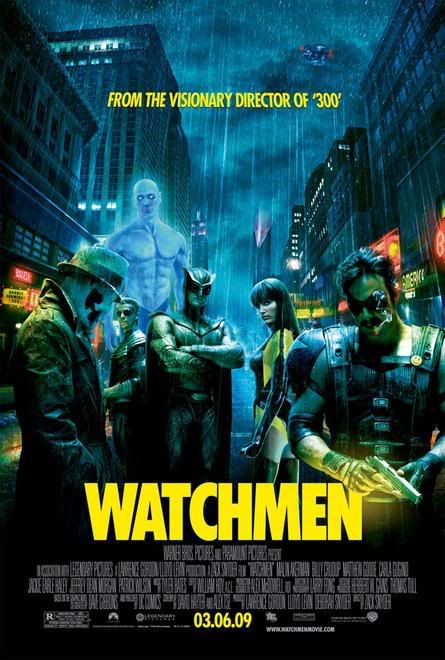
"Watchmen" stands apart from other superhero flicks in the sense that it teaches a history lesson - alternate history, that is, but history nonetheless. I read a book once in which 99.9% of Europe's population was destroyed during the Black Plague instead of the actual 30-60%, thus leaving the world to be colonized by Asia, Latin America and Africa instead of raping, pillaging whites. Unfortunately, there still would have been raping and pillaging, but the world would have been a very different place, and it was interesting to fantasize about what that would have been like.
In the reality of "Watchmen," the Soviet Union has not been crushed, and, in 1985, the United States is on the verge of nuclear war with the communist country. Superheroes exist in this alternate reality, as well - however, masked vigilantes have been criminalized and forced to go into hiding (a la "Incredibles") after their involvement in the path of history. The Watchmen are a reincarnation of the 1930s and 1940s super crew "The Minutemen," made up of a smorgasbord of super-strong misfits.
There is Silk Spectre, the only female member of the team, following in the footsteps of her mother, and, unbeknownst to her, her father, The Comedian. John F. Kennedy's assassination, along with a long list of political disasters, are put under the Comedian's belt, in the same way that Dr. Manhattan, the god-like glowing blue Oscar Award, is given credit for the victory in Vietnam. Dr. Manhattan is in a relationship with Silk Spectre, who is also attached to the subdued but strong leader of the Watchmen, Nite Owl. Dr. Manhattan and Ozymandias, another member of the team, are the only two Watchmen to have since revealed their true identities to the world, with the latter turning his history as a crime fighter into a multi-billion dollar industry. Finally, but certainly not least of all, is Rorschach, the narrator of the film, and also the only member of Watchmen to continue doing vigilante work despite it being illegal.
Phew!
The presence of these heroes has permanently altered history - in essence, they are the key difference between that reality and the one we live in. Without Dr. Manhattan's intervention in Vietnam, we would have lost of the war (as we did in THIS reality), and Nixon would have been impeached. In the end, however, the lesson that the movie seems to teach is that humans do not need superior beings looking after them - that the divine or the mighty would in fact make things worst for us in the long run. Whether this was a central theme in the comics, I don't know - but it was the lasting impression I got long after the lengthy film was over.
Is God dead? Have humans finally reached a place (in THIS reality, at least) where God's career has finally gone the route of Michael Jackson's, irrelevant yet hanging like a fart in stagnant air? Maybe. By the end of the film (if you are still conscious and/or interested), Dr. Manhattan is asked to take the blame for a catastrophe made to look like his doing - again, harkening back to the parallel that is drawn between him and God. It mirrors the way humanity, at least in the past, has thrown things that appear out of our control into the hands of a divine being. "We don't want to deal with it, so we'll leave it up to you." Isn't that the point of religion, anyway?
If you have a low threshold for bullshit and ranty monologues, then this movie is not for you. The effects were great, but a cool nuclear explosion is not enough to redeem the film from the nauseatingly self-masturbatory Dr. Manhattan, who masquerades with twig and berries free for about three quarters of the film. Would it have been so hard to CG a loincloth on that Smurf, or what?




No comments:
Post a Comment